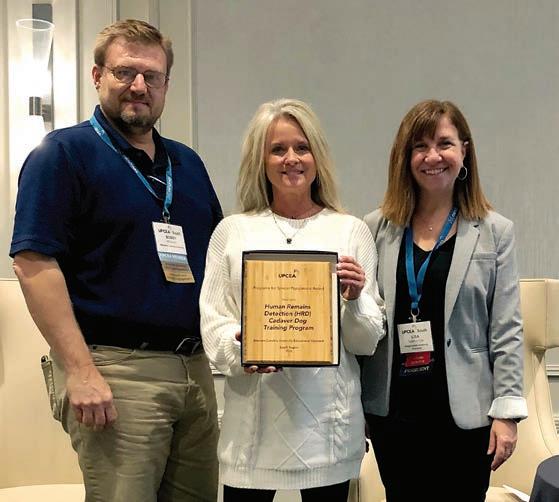
5 minute read
Free lunch for Swain Elementary students
BY HANNAH MCLEOD STAFF WRITER
All students in Swain County elementary schools will receive free lunch this year with the help of a grant from the Dogwood Health Trust.
“This grant is wonderful for these kids,” said School Food Service Director Michele Herron.
Herron and Kevin Allman wrote the very first health grant requesting money to support free lunches for elementary students in Swain County and Dogwood will fund the request for $75,000.
Dogwood Health Trust is a private foundation formed from the sale of the Mission Hospital System to HCA Healthcare. It serves 18 counties and Qualla Boundary in Western North Carolina through grant opportunities aimed at improving health and wellbeing.
According to superintendent Mark Sale, Dogwood was hesitant at first to think about funding the grant because “when one system does it another one wants to.” However, the argument from the school system is that almost all students at East and West Swain Elementary already receive free or reduced breakfast and lunch. Only a few students are left out.
“Thanks to Ms. Herron and Mr. Allman for their work on that,” said Sale when he presented the grant opportunity to the board of education on Nov. 14. “I only wish that we could expand that for all of our students.
Swain West Elementary qualifies for the Community Eligibility Provision, a program through the United States Department of Agriculture that allows schools with over a population of students qualifying for free or reduced lunch over 40% to provide free breakfast and lunch to all students without having to collect individual eligibility waivers. The school nutrition department is reimbursed through the USDA.
According to Herron, Swain East Elementary approximately 70% of students receive free or reduced lunch. If the nutrition department could apply for the Community Eligibility Provision now, the school would qualify for the program. However, those applications will not go out until later in the year.
Instead, the difference will be made up this year by the grant from Dogwood. This is a one-time grant and Herron is hopeful that both elementary schools will qualify for the Community Eligibility Program next year, enabling the school system to continue providing free breakfast and lunch to all elementary schoolers.
“I wish we could find something for the high school and middle school, it would be great,” said Herron. “A lot of them are struggling at the moment with high balances.”
According to Herron, despite all the outreach schools did at the start of this school year, many families were not aware that the free lunch available during pandemic school years was set to end this year. For this reason, there are many students who would qualify for free or reduced lunch but whose
families have not completed the necessary paperwork.
This is part of a larger push to provide free or reduced breakfast and lunch to all public school students. Some candidates for local school board races made this a central piece of their campaign. Superintendent Sale made it clear where he would stand if the opportunity arose to support such a measure.
“If the opportunity comes for us to support that, we’ll put together a letter, because I believe that every student needs to eat,” said Sale.
WCU human remains detection K9 training program wins award
Western Carolina University’s human remains detection cadaver dog training program was recently awarded the 2022 University Professional and Continuing Education Association award for special populations at the UPCEA South Conference in Atlanta.
This award recognizes outstanding professional development programs offered by universities across the southeast, from Virginia to Texas.
WCU’s HRD cadaver dog program, which is under the direction of Lisa Briggs, director of WCU’s emergency and disaster management program, has been offered at WCU since 2011.
HRD K9s are a specially trained group of search dogs who specialize in locating missing people in criminal investigations, suicides, overdoses, lost persons, natural disasters and structural collapses such as the twin towers on 9/11, and most recently the flood victims in Haywood County.
“Once thought of as a pseudoscience, understanding how canines can be effective and reliable as tools in human remains recovery is being accomplished at WCU through interdisciplinary relationships in the College of Arts and Sciences and WCU’s Forensic Osteology Research Station,” said Briggs.
In addition to directing the programs at WCU, Briggs also serves as a search and recovery specialist for the National Center for Missing and Exploited Children and is on the State Bureau of Investigation Human Remains Task Force, as well as a member of the Department of Homeland Security Reunification Team.
“One can only imagine for a moment their own family member being missing and unable to locate them to understand the significance of our work,” Briggs said.
She understands how important it is to have specialty trained K9s to locate the missing and is appreciative of the resources, relationships and support from the university not expect a K9 to be effective unless they are actually trained on that which the K9 team is searching for. There are very few locations in the country, or the world for that matter, who provide access to those who have donated their bodies to science like we have here at WCU.”
Handlers and their K9s come from countries all over the world and the nation to train in WCU’s program where Briggs and other experienced law enforcement K9 officers and trainers lead with first-hand experience in the recovery of human remains.
The Division of Educational Outreach facilitates the trainings that happen on campus throughout the year.
“Once the program began, word quickly spread and we saw surging demand from K9 handlers all across the United States and abroad who wanted to bring their dogs to Cullowhee for training,” said Bobby Hensley, associate director of continuing education in Educational Outreach. “Lately, the classes fill to capacity in about seven minutes from the time they are opened to law enforcement, fire, and search and rescue personnel. It is wonderful that our program received recognition from such a prestigious organization and to be selected the best program for special populations in the southeast is quite an award.”
WCU’s cadaver dog training program received an award recognizing its professional
development programs. Donated photo







